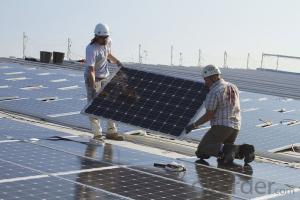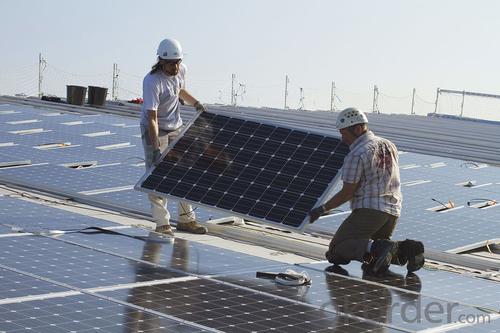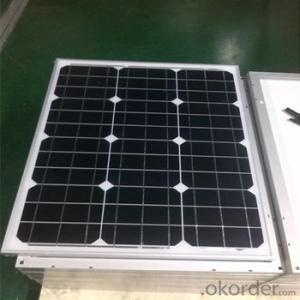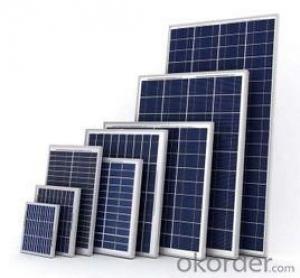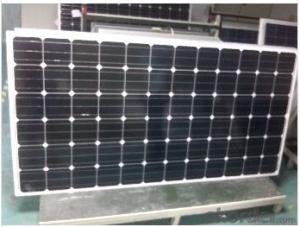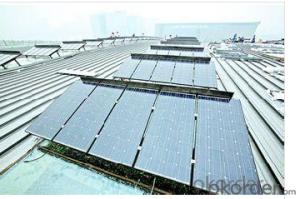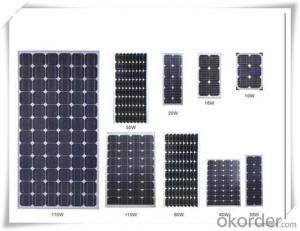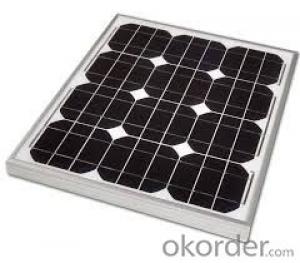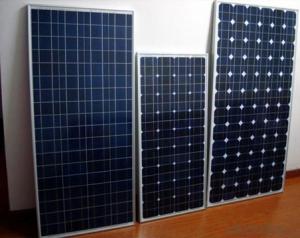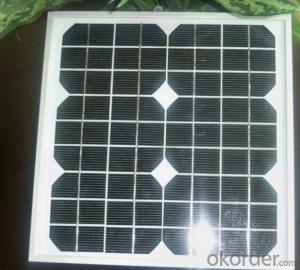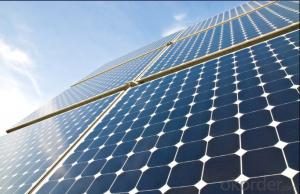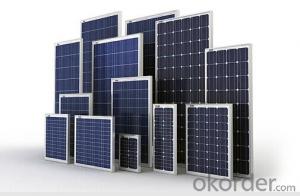Ultraviolet Factory Sales Small Monocrystalline Solar Panel CNBM
- Loading Port:
- Qingdao
- Payment Terms:
- TT OR LC
- Min Order Qty:
- 10 set
- Supply Capability:
- 300000 set/month
OKorder Service Pledge
OKorder Financial Service
You Might Also Like
1.5W to 180W Monocrystalline Solar Panel
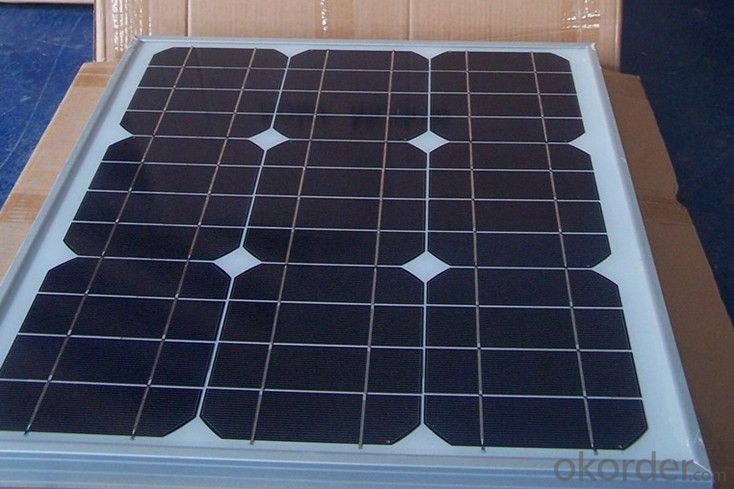
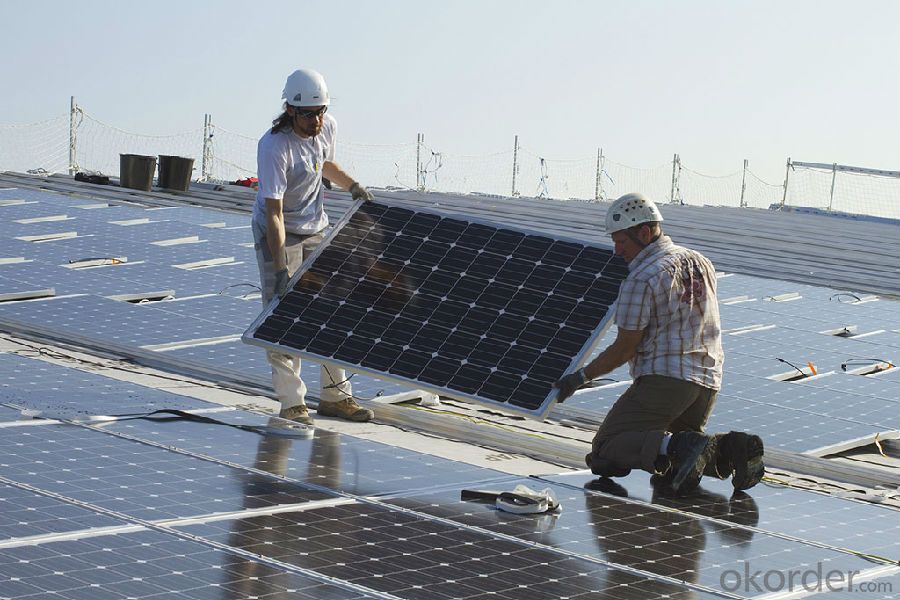
Quick Details
Place of Origin: | China (Mainland) | Brand Name: | CNBM | Model Number: | XRP-156M-250W |
Material: | Monocrystalline Silicon | Size: | 1620x992x40mm | Number of Cells: | 60 |
Max. Power: | 250w | Optimum Operating Voltage (Vmp): | 28.8V | Optimum Operating Current (Imp): | 8.68A |
Open Circuit Voltage (Voc): | 36V | Short Circuit Current (Isc): | 8.87A | Maximum Power at STC (Pmax): | 250W |
Operating Module Temperature: | -40 °C to +85 °C | Maximum System Voltage: | 1000 V DC (IEC) / 600V DC (UL) | Maximum Series Fuse Rating: | 15A |
Packaging & Delivery
Delivery Detail: | two weeks after order confirmation |
Features:
1) High Module conversion efficiency, through superior manufacturing technology
2) 0 to +5W positive tolerance for mainstream products
3) Certified to withstand high wind loads and snow loads
4) Anodized aluminum is for improving corrosion resistance
5) Anti-reflective, Highly transparent, low iron tempered glass
6) Excellent performance under low light environment
Benefit:
25-year performance warrant
10-year Product warranty
Electrical Characteristics:
Item No. | XRM-250W |
Optimum Operating Voltage (Vmp) | 28.8V |
Optimum Operating Current (Imp) | 8.68A |
Open Circuit Voltage (Voc) | 36V |
Short Circuit Current (Isc) | 8.87A |
Maximum Power at STC (Pmax) | 250W |
Cell Efficiency | 17.70% |
Operating Module Temperature | -40 °C to +85 °C |
Maximum System Voltage | 1000 V DC (IEC) / 600V DC (UL) |
Maximum Series Fuse Rating | 15A |
Power Tolerance | 0/+5 % |
STC: lrradiance 1000 W/m2, module temperature 25 °C, AM=1.5;
Best in Class AAA solar simulator (IEC 60904-9) used, power measurement uncertainty is within +/- 3%
Mechanical Characteristics:
No. of Cells | 60(6X10) |
Dimensions | 1640x992x40MM |
Weight | 20.0KGS |
Front | Glass 4.0 mm tempered glass |
Frame | Anodized aluminium alloy |
Temperature Characteristics:
Nominal Operating Cell Temperature (NOCT) | 45±2°C |
Temperature Coefficient of Pmax | -0.44 %/°C |
Temperature Coefficient of Voc | -0.33 %/°C |
Temperature Coefficient of Isc | 0.055 %/°C |
Refer to the Wmp range
Our factory can produce solar panel and solar module from 1.5W-290w (1.5w, 2.5w, 5w, 10w, 20w, 40w, 50w, 60w, 80w, 85w, 125w, 135w, 150w, 165w, 180w), according to customers requirement.
(A). Wmp range: 0.01W-6W, to be sealed with epoxy resin on PCB (printed circuit board), or to be sealed in plastic directly.
(B). Wmp range: 0.01W-15W, to be encapsulated with PET, on PCB (printed circuit board)
(C). Wmp range: 1W-60W, to be encapsulated with PET, on stainless steel, with holes for assembling purpose.
(D). Wmp range: 1W-290W, to be encapsulated with tempered glass, EVA, TPT, together with aluminium frame, junction box and (if necessary)diode and cable.
Refer to the material:
Monocrystalline solar cell or polycrystalline solar cell
Efficiency range 14%-17%, cell size 5/6.
- Q: Does anybody know if there are any courses for solar panel installation, and/or what trades you need for this position?
- In Europe the governments offer an electrical buy back incentive of surplus solar electricity but to claim the income the solar panels must be installed by a registered installer who submits details of their skills. The skill to install requires some experience in building/roofing work for which there is no qualification and an electrician to wire up the components to the mains. Electrical engineering courses are available at local tech colleges. If you are just installing a 2/24 volt system you don't really need much experience, it is not syncing a full mains voltage in to the domestic mains! Installing thermal [water] solar uses similar building skills and requires he final fix to be performed by a heating engineer, again the course is available at tech colleges. both plumbing and electrical engineers need to be updated on changes and so there is ongoing education costs and licenses. If you can't afford college [two year +] try finding an employer who will let you work and study part time. There is a lot of demand here so few employers pay for the course but some do. go through your yellow pages and submit your cv to electricians/plumbers. Then when you get qualified learn about solar, and set up your own business. As a builder of sorts! Ive fitted systems and then found a electrician/plumber to do the final fix. You cant beat experience.
- Q: For my exam in science we are required to make a power point explaining why it would be good for our school to switch to solar. our complete handout given to us by our teacher is as follows:Power Point to include:. What you propose for alternative energy usea. Any thoughts on energy conservation...2. Why this is a good idea3. What information you would give the solar company (area of roof space your group determined to be useable for solar)In PowerPoint - include your quot;scriptof what you would be saying when the slide is up in the Notes section below the slideANY HELP WOULD BE GREATLY APPRICIATED!!THANK YOU SO SO MUCH,QH
- Create okorder /
- Q: We are thinking about useing solar panels for our house.Does anyone know about solar panels? If so could you please tell me some information on them,and the cost for a home,to install them.
- Solar electricity systems can save you more money. Want to know more features about Solar Panels Companies? Contact us today for more details.
- Q: please help me
- Solar okorder /
- Q: Can solar panels be used in areas with high levels of snowfall?
- Yes, solar panels can still be used in areas with high levels of snowfall. While snow accumulation on the panels can temporarily reduce their efficiency, modern solar panel designs and technologies have improved to withstand heavy snow loads. Additionally, the angle at which solar panels are installed and their smooth surface can help snow easily slide off, allowing them to continue generating electricity even in snowy conditions.
- Q: Can solar panels be used to power an emergency response center?
- Yes, solar panels can be used to power an emergency response center. Solar panels can generate electricity from sunlight, which can then be stored in batteries or directly used to power the center's equipment and infrastructure. This renewable energy source can provide a reliable and sustainable power supply, making an emergency response center less dependent on traditional energy sources during critical situations.
- Q: how to make electricty using solar panels or wind generator
- Hey Bandit, there are some really good websites on the subject, my favorites are operated by non profit groups, I will list them below. As the old saying goes, the best things in life are free, but there is one really good exception to that rule. Home Power Magazine is the only periodical that gets into the nuts and bolts of home grown energy. We started reading it 2 years ago. A couple years after that we attended an energy fair that was listed in the magazine, ended up buying our first solar panel and wind turbine on the spot, and hooking up a small 2 volt power system for our home that year. It worked really well, we did make some mistakes, but with the knowledge and experience we gained, we were able to get into a larger system a few years later. Now our home generates almost all its own power, and we use the utility company for backup. There is a .4 kw solar array on the garage roof, and a kw turbine on a metal tower in the field behind the house. We have also installed a batch solar water preheater and have 2 wood stoves for heat. Now our electric bills are around $6 per month. If your handy at all hooking up electrical devices, you could put together a small system like we did years ago and use it to run some small 2 volt lights and electronics. We still have our little system today, it operates the cabinet lighting in the kitchen, a few radios and phone answering machine, and we have 2 volt outlets in each room. They're handy for stuff like charging your cell phone with a car cord. I would suggest looking at the websites first, and if you're really interested, go for a one year subscription to Home Power. If you subscribe, you can even use their website to look at archived articles from years past. There is even one on our small system, the magazine liked the idea so much they wrote it up. Use their search engine to look for, Small System First. Hope you find all this interesting. Take care Bandit, Rudydoo
- Q: i am very new to the solar world and i need help with some stuff to understand what i need to do.what AH battery should i use? i am planning on getting a 2V deep cycle gel based battery but i want to get the most power for my system so should i use something like a few 00AH in a battery bank system or a bunch or 50 or so amp hour batteries in a bank. also what kind of power am i looking at for the best battery system. in other words what kind of basic appliances like lighting, laptop,space heaters etc can can i run on the selected battery system and for how long? any help would be highly appreciated.
- I'm sure that you might discover everything concerning solar power at www.okorder .
- Q: How do solar panels impact the environment?
- Solar panels have a positive impact on the environment as they generate clean, renewable energy without emitting harmful greenhouse gases or pollutants. They help reduce reliance on fossil fuels, decrease air and water pollution, and combat climate change, making them a sustainable and environmentally friendly choice for energy production.
- Q: That one costs money but looks like it might work. I don't really have the money for it but if it works then it would probably be worth it. Do homemade solar panels really work or is it just a gimmick? I'm really interested to see if anyone has actually tried this and to see what they say about it.Thanks
- Solar photovoltaic cells oxidize, commercial panels are hermetically sealed but DIY panels degrade rapidly with time. Sizing the broken solar cells by individual measurements are labor intensive and the additional soldering makes them unreliable. Also, their irregular shapes result in less of the panel's surface area being covered with cells. They do work but not well and they deteriorate quickly.
Send your message to us
Ultraviolet Factory Sales Small Monocrystalline Solar Panel CNBM
- Loading Port:
- Qingdao
- Payment Terms:
- TT OR LC
- Min Order Qty:
- 10 set
- Supply Capability:
- 300000 set/month
OKorder Service Pledge
OKorder Financial Service
Similar products
Hot products
Hot Searches
Related keywords
